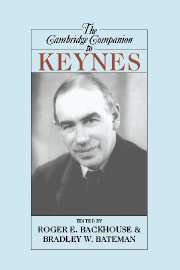Book contents
- Frontmatter
- 1 A cunning purchase: the life and work of Maynard Keynes
- 2 The Keynesian revolution
- 3 Keynes and the birth of modern macroeconomics
- 4 Keynes as a Marshallian
- 5 Doctor Keynes: economic theory in a diagnostic science
- 6 Keynes and British economic policy
- 7 Keynes and Cambridge
- 8 Keynes and his correspondence
- 9 Keynes and philosophers
- 10 Keynes’s political philosophy
- 11 Keynes and probability
- 12 The art of an ethical life: Keynes and Bloomsbury
- 13 Keynes and ethics
- 14 Keynes between modernism and post-modernism
- 15 Keynes and Keynesianism
- Bibliography
- Index
11 - Keynes and probability
Published online by Cambridge University Press: 28 November 2006
- Frontmatter
- 1 A cunning purchase: the life and work of Maynard Keynes
- 2 The Keynesian revolution
- 3 Keynes and the birth of modern macroeconomics
- 4 Keynes as a Marshallian
- 5 Doctor Keynes: economic theory in a diagnostic science
- 6 Keynes and British economic policy
- 7 Keynes and Cambridge
- 8 Keynes and his correspondence
- 9 Keynes and philosophers
- 10 Keynes’s political philosophy
- 11 Keynes and probability
- 12 The art of an ethical life: Keynes and Bloomsbury
- 13 Keynes and ethics
- 14 Keynes between modernism and post-modernism
- 15 Keynes and Keynesianism
- Bibliography
- Index
Summary
INTRODUCTION
Keynes is most famous as an economist, but he was involved with probability from the very beginning of his research career, and in fact his first piece of academic research was in the philosophy of probability. Keynes's interest in probability began as an undergraduate. He started his degree in 1902, and in 1903 he was initiated into Cambridge's secret society of elite intellectuals, known as the Apostles. A paper that he read to this society in January 1904 contains his first discussion of the philosophy of probability (Skidelsky 1983: 152). In those days, the PhD degree did not exist in Cambridge, and bright graduate students were expected to submit dissertations in the hope of obtaining college Fellowships. In 1907, Keynes submitted a dissertation on probability for the prize competition at King's College Cambridge, but surprisingly he was unsuccessful. The college awarded Fellowships instead to two gentlemen by the names of Dobbs and Page. In 1909, however, Keynes did win a Fellowship at King's with a revised version of his dissertation on probability. Incidentally, Alan Turing, the computer pioneer, won a Fellowship to King's with a dissertation on probability on his first attempt in 1935. Keynes was on the committee which awarded Fellowships that year.
- Type
- Chapter
- Information
- The Cambridge Companion to Keynes , pp. 199 - 216Publisher: Cambridge University PressPrint publication year: 2006
- 12
- Cited by



